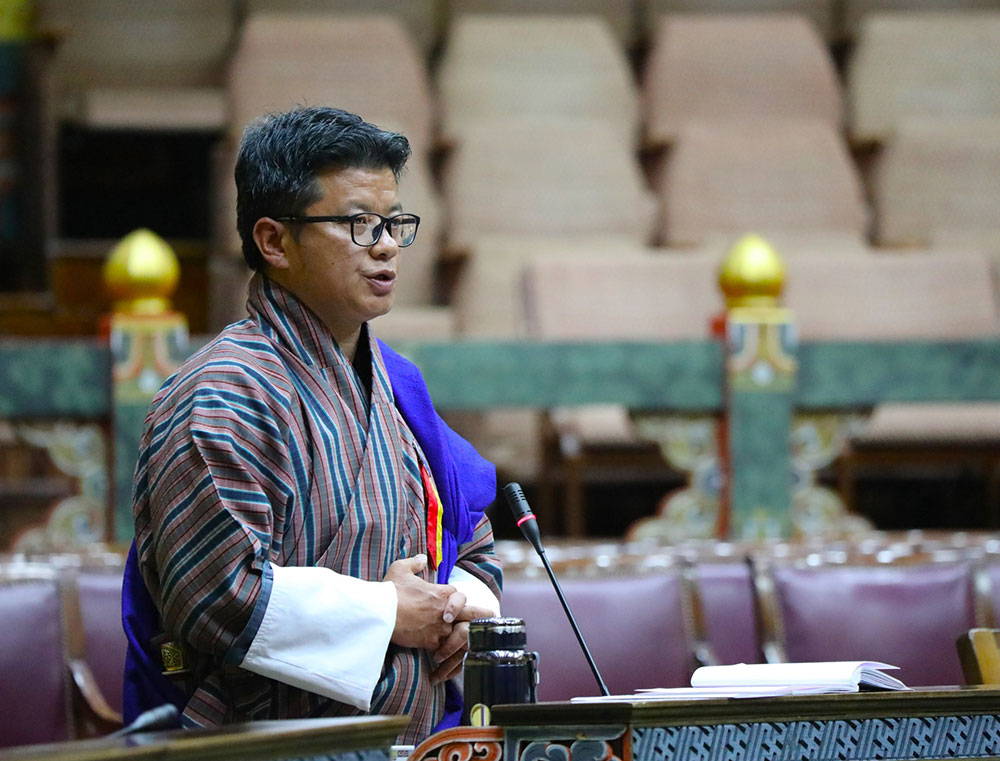YK Poudel
To address the challenges faced by Bhutanese exporters, MP for Bartsham-Shongphu, Passang Dorji, raised concerns during the thirteenth sitting of the ninth session of the third parliament, questioning the government’s involvement in promoting and assisting exports from Bhutan.
The issue of export challenges has been a recurring topic in parliamentary discussions, with Bhutan projecting a trade deficit of up to 54 percent this year.
MP highlighted the adverse impact of export difficulties on Bhutan’s foreign currency reserve, emphasising particularly the challenges faced by exporters in West Bengal.
He said that Bhutanese exporters have to make early bookings through the “Suvidha App,” a web-based vehicle facilitation system, and bear substantial costs for exporting to India and Bangladesh.
These challenges, according him, are in contradiction to the understanding between Bhutan and India. Agreement on free trade between India and Bhutan has its say that import-export items move freely between the two countries.
Prime Minister Dr Lotay Tshering acknowledged the long-standing issue, saying that governance and policy differences in West Bengal from that of the centre are making things complicated.
“The Bhutanese government has made various efforts to improve exports and address the issues,” said Prime Minister. “We have established the Trade Facilitation Committee in Samtse, Gelephu, Phuentsholing, and Samdrupjongkhar, which involves officials from the government and private institutions.”
The Bhutanese government, Prime Minster said, does not have the authority to engage directly with the West Bengal government.
However, the government has included plans for the construction of an integrated custom system (ICS) in at least two locations in Bhutan in the next five-year plan.
Recent changes by the West Bengal government have further exacerbated the situation. On January 4, the fees for the Suvidha system were revised, with non-perishable goods now subject to an increased fee of INR 10,000, boulders at INR 5,000, and perishable goods at INR 3,000 at the Changrabandha land customs station (LCS).
Bhutan Exporters Association (BEA) reached out to Prime Minister on January 17, requesting intervention and exemption from the Suvidha fee. However, no progress has been made thus far, leaving drivers transporting goods to India or Bangladesh to complete procedures and depart together at 7:30pm.
The trade relationship between Bhutan and India dates back to 1972 when the first formal Agreement on Trade and Commerce was signed.
The agreement has undergone five revisions to date, with the current Agreement on Trade, Commerce, and Transit between Bhutan and India set to expire in 2026.
The Article V of the agreement explicitly ensures that Bhutan’s exports and imports to countries other than India remain free from customs duties and trade restrictions imposed by the Indian government.
The Suvidha online web-based system, implemented by the West Bengal government, was introduced to facilitate the quick clearance and smooth movement of vehicles through integrated check-posts on the Indo-Bangladesh border.
Bhutanese exporters ferrying goods to Bangladesh must register in the Suvidha system at eight Land Customs Stations, including Jaigaon, Changrabandha, and Fulbari.
According to the Suvidha website, the West Bengal government plans to expand the system to cover all of West Bengal’s international borders, including the integrated check-post in Jaigaon, which directly affects Bhutan.


